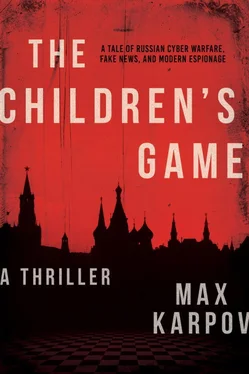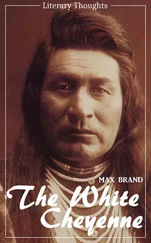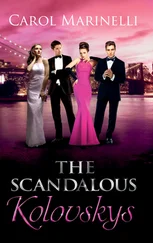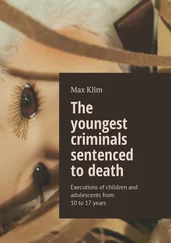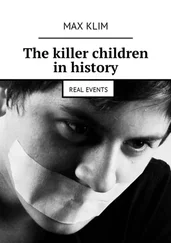“I knew Yeltsin, too, a much more gracious man,” he said, speaking robustly again. “He could have been great. History gave him that. But the alcohol…”
“I’m curious, though. You asked specifically to see me.”
“I did.”
“You’ve heard something about our friend, I’m told,” Chris said, prompting him as they strolled past the formal gardens. “I understand you have a name.”
“I do.” Another half-minute passed before he spoke again. Finally, he turned to Christopher and, with his ventriloquist’s lips, gave him the name—first, patronymic, and last: “Ivan Mikhailovitch Delkoff.”
Ivan Delkoff . It was a name Christopher knew. Delkoff was one of the rogue separatist leaders in eastern Ukraine, a fanatic right-wing Russian commander. “The crazy colonel,” some in the Russian media had labeled him.
“They met in the spring, I’m told,” Petrenko said. “In Moscow. It followed Turov’s visit to the dacha in April. I will give you the dates.”
By dacha Chris assumed he meant the Russian president’s home, outside Moscow.
“I’m told Delkoff was followed by FSB for several weeks early in the summer. He’s made at least two trips into Ukraine since then, supposedly to plan strategy with Russian separatists. But I understand he also met with a deputy director from SBU on at least one of them,” he added, naming Ukraine’s secret service agency.
Christopher said nothing at first, not quite believing him. “Why would he meet with the SBU? They should be enemies. Of the worst kind.”
“Yes, I know.” He stopped talking briefly, as a pair of joggers ran past. “Should be. Enemies with a common enemy. And purpose, perhaps.”
Christopher processed what he was saying: the implication being that their “common enemy” was Russia’s president, Vladimir Putin. Could Turov be working for a fifth column within the Kremlin now? Could the target be Putin himself? That would make it a far different operation than Martin Lindgren had suggested. Did Martin know this? Did the White House?
“You have a second question,” Petrenko said.
“Yes.” Chris allowed a smile. “I was told our friend may be planning something called the children’s game. Does that mean anything to you?”
“Yes. It does.” Petrenko pointed to a new path, and didn’t speak again until they had come to a green lawn with a giant chessboard and two-foot-tall chess pieces, set up as if mid-game. Christopher sensed that this was where he’d been headed all along. “Sit?”
They settled on a wooden bench facing the chess board. Petrenko nodded at it. “Children’s mate,” he said. “You call it beginner’s mate, I believe.”
“Beginner’s mate in chess. That’s the children’s game?”
“Yes. Would you like me to show you?”
Christopher wondered at first if he was going to get up and move the game pieces. But he was searching for a pen, patting his shirt and trousers pockets as if doing a Columbo impression.
“Beginner’s mate is defeating your opponent in four moves,” Chris said.
“Correct.”
Russia, of course, tends to underestimate the West, he thought. And overestimate itself.
Petrenko showed his smile—which resembled a forced grimace—as if he could hear what Chris was thinking. “Of course, they say that America plays a different game,” he said. “America’s game is Pigeon Chess: you knock over the pieces, shit all over the board, and then strut around as if you’ve won.” His head thrust back and he snorted twice, revealing a lopsided alignment of teeth. This was a joke that Putin himself told, Chris had heard. Anti-Americanism was still rampant in Russia, a country where nearly all television news was state-controlled. Many Russians attributed the country’s economic woes to the US. It was a classic diversion: invent a villain, then blame the villain for your troubles. “If you have one more question, go ahead,” Petrenko said, a sudden tension in his voice, “because I have to go.”
“What’s it about?” Chris said. “What are the four moves?” Petrenko flicked the fingers of his right hand dismissively. “An attack in the Baltics? A Crimea-style forced annexation?”
Petrenko’s head tilted to one side and his lower lip jutted out: perhaps . “Candidly? My impression is it will be something much closer to home. Your home. But I can’t tell you what.”
“How soon?”
“Soon.” Petrenko smiled evasively. “Days, perhaps. I don’t know, exactly.”
“Who’s he doing this for? Who’s Turov working for if not the Kremlin?”
Petrenko made a face, as if he hadn’t considered that, and checked his watch. “I could find out more, of course. But it would involve some risk.”
“How much?”
“Eighty-five?” Eighty-five thousand . Christopher Niles lifted his chin neutrally to show he had heard. He wondered what the sea breeze felt like right now on their Greek island. They rose and began to walk again, through the blue afternoon shadows to the park entrance, Chris beginning to sift what Petrenko had given him: the unlikely tip that Ukraine’s secret services were involved in Turov’s op, the threat of “something much closer to home.” He thought of a soldier he knew who’d worked with Delkoff once, a former Navy SEAL named Jake Briggs. If this was about Ivan Delkoff, then Christopher wasn’t the right man for the job. But maybe Briggs was.
Stopping at the road, Petrenko forced a smile and clasped his arm, bringing the pretense to a close: two old acquaintances bumping into each other in the park. Petrenko moved closer, peculiarly closer, to shake his hand; he could smell the onion he’d had for lunch. When he pulled his hand away, Chris felt a USB drive in his palm.
“One other thing you might consider,” Petrenko said. “Assuming the game is four moves? You might consider that at least one of them has already been played. Some time ago. And no one in your country noticed.” He smiled, adding, “Let me know about the offer.”
Turning, Max Petrenko was nearly run over by a speeding bicyclist.
Wednesday, August 11. Eastern Ukraine.
Ivan Delkoff sat on a wooden ammo case in the abandoned barn, looking out at fields of yellow sunflowers as he smoked a Russian cigarette. He was dressed in his usual attire—faded camo fatigues and combat boots, the boots so worn in places they resembled reptile skin.
Alexander Zelenko, his lieutenant, was just outside talking with Pletner, the driver, telling him war stories in his nasally voice, unaware that Delkoff could hear him.
When Delkoff had first hired Zelenko, the Russian soldier reminded him of his own son, with that resolute mouth, the prominent Adam’s apple, and dark, liquid eyes that seemed eager for anything. This talkativeness, though, was something new. Something Delkoff hadn’t seen during their weeks of training.
The operation was two days off now and Zelenko was worrying him.
They had stopped at this farm near Donetsk to switch vehicles and eat a quick lunch before the final leg of the journey. Zelenko had cooked the three of them chicken cutlets on a propane stove and they were having a smoke now before moving on. They were inside the checkpoints again, in Russian separatist-controlled territory, part of the self-proclaimed Republic of Donetsk, what Delkoff considered Novorossiya. New Russia. Or Malorissiya. Little Russia. But they were moving toward disputed territory, where the Ukrainian army still held positions.
Delkoff finished his cigarette and listened to Zelenko telling Pletner about the tank battalion he’d belonged to shortly after the war began, in 2014. How one of their tanks had been hit through the turret, but they’d gone on, routing the Ukrainian guards, liberating a village from the khokhols —the derogatory term some soldiers used for Ukrainians. “Sometimes, the enemy are men just like you,” Zelenko told Pletner. “But if you think that way for long, you’re dead. In war, killing is just a survival tactic.”
Читать дальше
